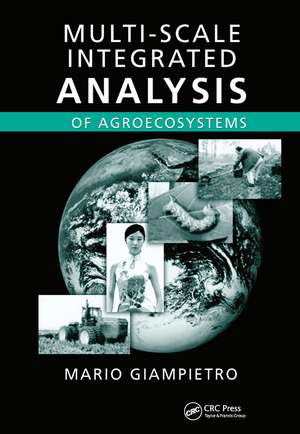Multi-Scale Integrated Analysis of Agroecosystems
Autor Mario Giampietroen Limba Engleză Paperback – 19 iun 2019
Multi-Scale Integrated Analysis of Agroecosystems explores alternative ways to study agricultural sustainability, presenting new approaches to organizing data and applying complex systems theory to actual cases. This innovative text recognizes the changing dynamics of the multiple processes and cross-relations within an environment, proposing a clearer analysis of agroecosystems than that which can be provided by rigid, reductionist methods.
Main concepts, new vocabulary and narratives, and practical examples open the book, followed by technical chapters that provide a more detailed explanation of concepts. The final section of the book presents a tool kit based on these concepts, resulting in strong support of empirical observations that challenge traditional notions regarding the sustainability of farming systems, food systems, and agroecosystems.
Preț: 508.10 lei
Preț vechi: 597.75 lei
-15% Nou
Puncte Express: 762
Preț estimativ în valută:
97.22€ • 101.78$ • 80.45£
97.22€ • 101.78$ • 80.45£
Carte tipărită la comandă
Livrare economică 05-19 aprilie
Preluare comenzi: 021 569.72.76
Specificații
ISBN-13: 9780367394813
ISBN-10: 0367394812
Pagini: 472
Dimensiuni: 178 x 254 x 23 mm
Greutate: 0.98 kg
Ediția:1
Editura: CRC Press
Colecția CRC Press
ISBN-10: 0367394812
Pagini: 472
Dimensiuni: 178 x 254 x 23 mm
Greutate: 0.98 kg
Ediția:1
Editura: CRC Press
Colecția CRC Press
Public țintă
Professional Practice & DevelopmentCuprins
Science for Governance: the Clash of Reductionism Against the Complexity of Reality. Complex Systems Thinking: Daring to Violate Basic Taboos of Reductionism. Complex Systems Thinking in Action: Multi-Scale Integrated Analysis of Agroecosystems.
Descriere
This book explores alternative ways to study agricultural sustainability, applying complex systems theory to actual cases. This innovative text recognizes the changing dynamics of the multiple processes and cross-relations within an environment, and proposes a clearer analysis of agroecosystems than that which can be provided by rigid, reductionist methods. Main concepts, new vocabulary and narratives, and practical examples open the book, followed by technical chapters that provide a more detailed explanation of concepts. The final section of the book presents a tool kit based on these concepts, resulting in strong support of empirical observations that challenge traditional notions of the sustainability of farming systems, food systems, and agroecosystems.
